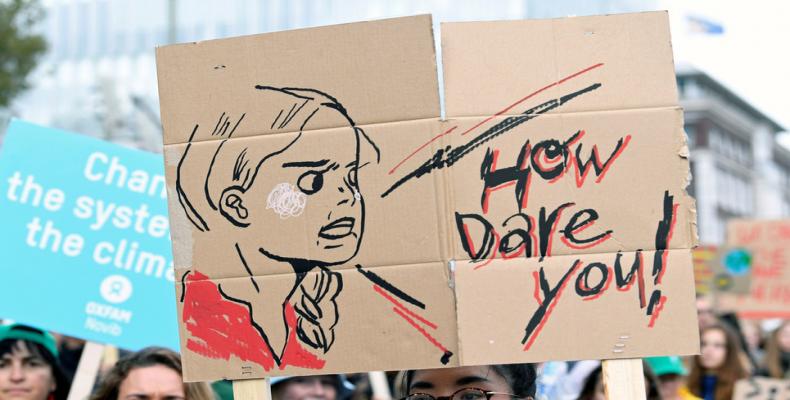New York, September 29 (RHC)-- Environmental activist Greta Thunberg’s searing address at the United Nations earlier this week earned enthusiastic praise from climate researchers, with many saying that the 16-year-old has found ways to raise awareness of climate science, galvanize support and resonate with people in ways that they have struggled to for decades.
“Speaking as a climate change scientist who has been working on this issue for 20 years and saying the same thing for 20 years, she is getting people to listen, which we have failed to do,” said Saleemul Huq, director of the International Centre for Climate Change & Development in London. “I thought it was the most powerful speech I’ve ever seen.”
Sally Benson, co-director of the Precourt Institute for Energy at Stanford University, applauded Thunberg’s emotional remarks and her efforts to mobilize young people to demand action on climate change.
“She has been a catalytic leader,” Benson said. “We’re seeing more grassroots action, and she’s creating a movement where young people are pushing communities, cities, states and corporations and saying, ‘we’re not going to wait.’”
Thunberg’s impassioned statement at the U.N. chided world leaders for not doing enough to address climate change and emphasized the urgency of the global situation, referring often to figures from a seminal report released by the Intergovernmental Panel on Climate Change in October 2018 on the impact of 1.5 degrees Celsius of global warming.
The report stated that the planet has already warmed by 1 degree Celsius since the 19th century, and used 1.5 degrees as a threshold beyond which the effects of climate change, such as melting ice, extreme heat and sea-level rise, become life-threatening for tens of millions of people around the world.
“The popular idea of cutting our emissions in half in 10 years only gives us a 50 percent chance of staying below 1.5 degrees and the risk of setting off irreversible chain reactions beyond human control,” Thunberg said.
But even the possibility of reducing global carbon dioxide (CO2) emissions so drastically by 2030 is fast becoming impractical, according to Simon Donner, a climatologist at the University of British Columbia in Vancouver, Canada.
“Mathematically and technically, it is possible, but it’s not realistic,” Donner said. “To reduce emissions that sharply in what is now only a 10-year period would take enormous changes in countries around the world.”
Recent trends have demonstrated how challenging it is to even keep carbon emissions level. A report released last year by the Global Carbon Project, formed by an international consortium of climate researchers, stated that global carbon emissions hit a record high in 2018. After a period of stability from 2014 to 2016, global greenhouse gas emissions rose in 2017 and then jumped another 2.7 percent in 2018 to an all-time high of more than 37 billion metric tons.


